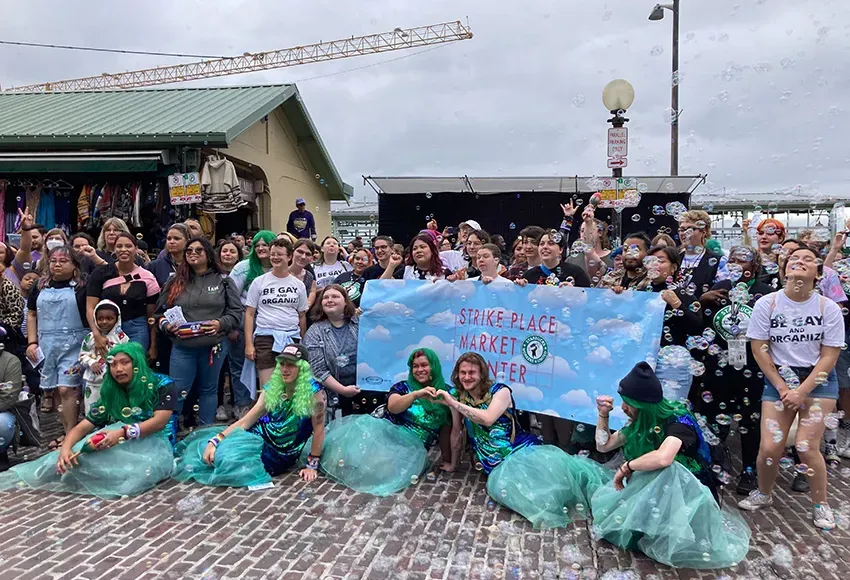A national bus tour of Starbucks workers hit Seattle on Monday, August 7, kicking off two days of actions in support of Starbucks Workers United (SBWU), the union organizing Starbucks stores across the country.
The tour, which started in Minneapolis-St. Paul on July 10, was intended to spark new organizing efforts and highlight the ongoing struggles of unionized Starbucks stores to get their employer to sit down and bargain for a contact.
Seattle – home of the company's corporate headquarters – was the final and climactic stop.
On Monday, the SBWU bus stopped at the world's very first Starbucks in the Pike Place Market, which was renamed "Strike Place Market" for the occasion.
About a hundred Starbucks workers, joined by supporters from other unions and the wider community, rallied in front of the store, calling for a strike in support of employees' organizing. Later in the day, workers set up "bargaining tables" in front of some Starbucks stores, symbolizing the company's refusal to sit down with them and bargain for a union contract.
The next day, August 8, some 150 SBWU workers marched on Starbucks corporate headquarters at First Avenue S. and S. Lander Street.
Ahead of the march, community supporters had infiltrated the Reserve Roastery in the headquarters building, posing as customers. When SBWU entered the store in a silent march, supporters rose, held up their fists in a sign of solidarity and revealed previously concealed signs that read "Customers support union coffee," "You deserve a union," "Union strong," and similar pro-union statements.
Customers looked on – many with approval, others in surprise – as Starbucks workers and their supporters stood silently with signs and banners for 10 minutes, then marched out of the store.
US Rep. Pramila Jayapal spoke at a post-action rally down the street from the Starbucks building. She noted that when Starbucks was founded, it consisted of six unionized stores. When current owner Howard Schultz bought the company and turned it into a multinational megacorporation, he dissolved the union and has fought unionization ever since.
April Sims, president of the Washington State Labor Council (WSLC), also spoke. Sims, whose organization represents some 400 union locals and district councils and half a million workers, pointed out that SBWU organizing is gaining momentum, with more than 340 stores in 41 states currently unionized. Sims is the first woman to head the WSLC and the first African American woman to lead a state labor council.
Starbucks workers charged that the company has responded to unionization efforts by firing individual activists and closing stores that had unionized or were in the process of doing so. Four stores have been closed in the Seattle area, including the first Seattle store to unionize, the popular Capitol Hill location at Denny and Broadway.
Nevertheless, SBWU has continued to rack up local victories. The Redmond Starbucks location has voted to unionize, and stores at Seattle Center and Third Avenue and Madison Street have filed for union elections.
Maia Hepburn, a worker at the Seattle Center Starbucks, told the crowd that the turning point for her came at the end of a "truly exhausting shift."
"I felt like quitting," she recalled, "but I also felt like that would be abandoning my friends and fellow workers." She then turned to union organizing, thinking that "we have to make it better by ourselves."
Liz Duran, a worker at the already unionized Reserve Roastery on Pike Street, said they were "so proud of every worker at every store" that was fighting for a union, and promised they would all keep fighting "till we get to a contract." They then led a chant of "See you at the bargaining table!"
Ari Bray, a worker at the also-unionized U District Starbucks, explained that SBWU had laid out all its demands to the company, but Starbucks had yet to respond with a single proposal of its own.
"It hasn't been easy," they told the SGN. "The company has resorted to scorched-earth tactics. But we're still here, we're still organizing, we're still reaching out to other workers, and we're winning."


